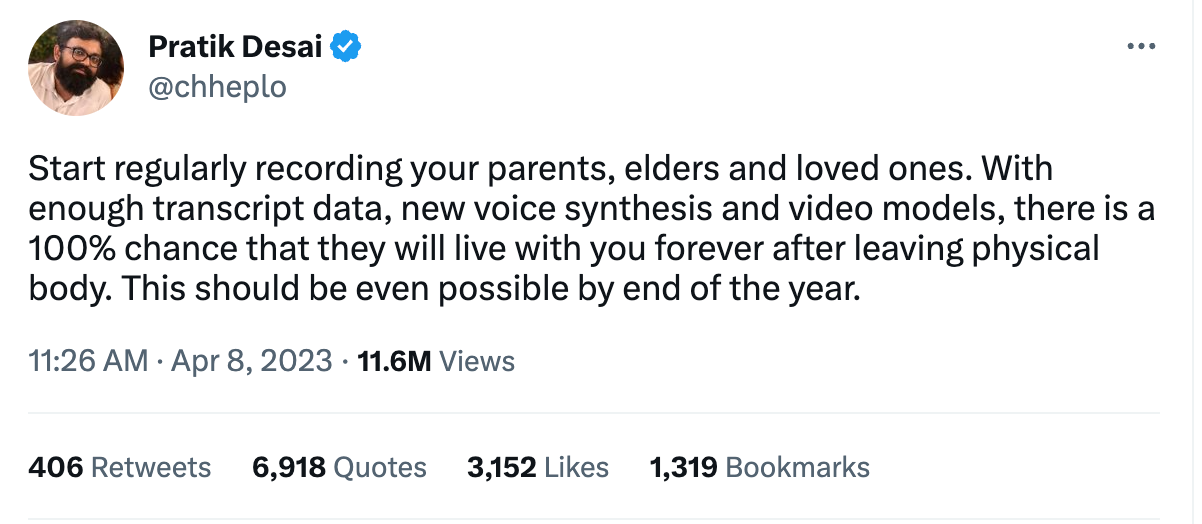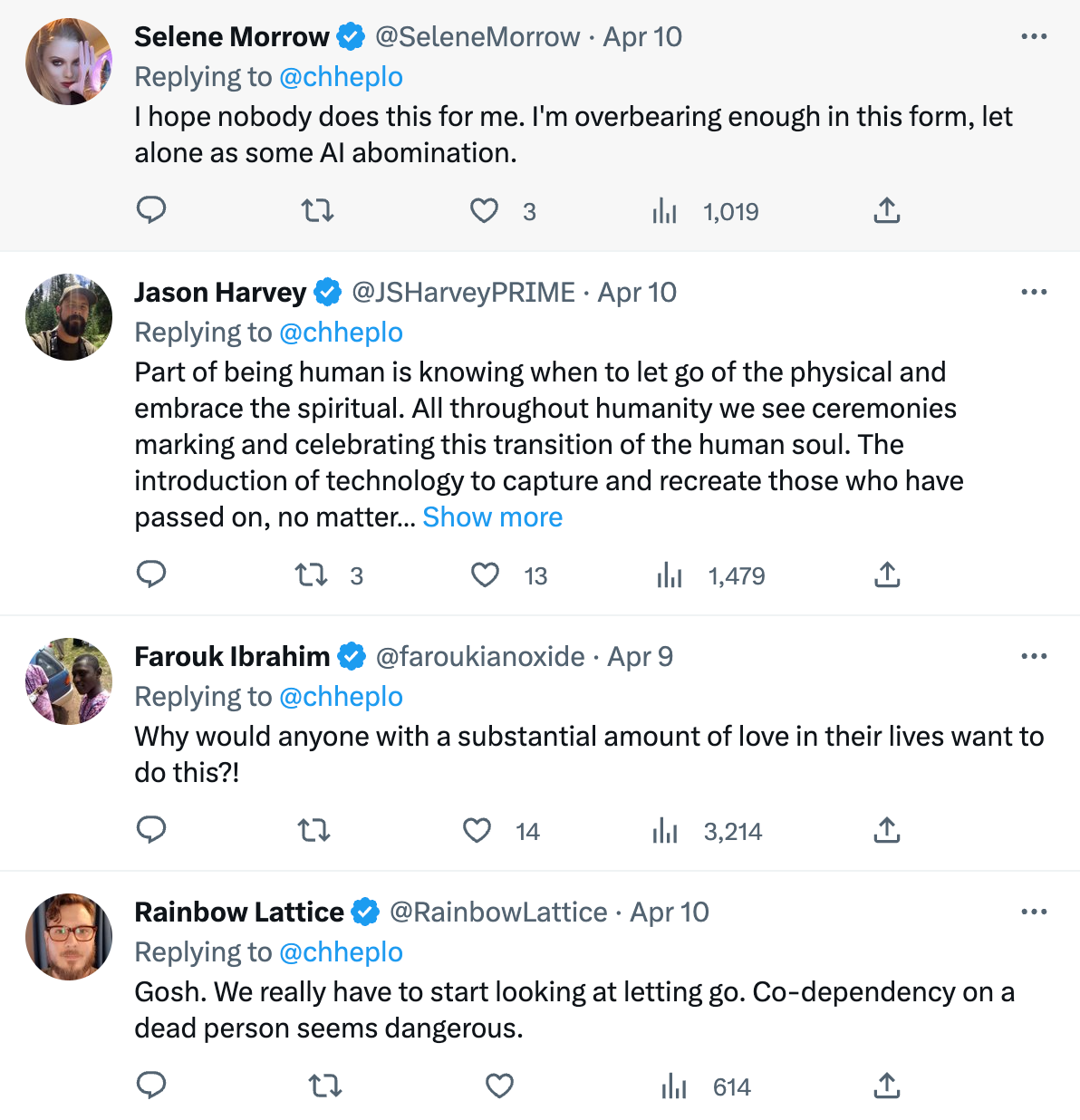Plus the Generative-AI News Roundup

AI Policy
The Biden administration is implementing new AI accountability measures to ensure privacy, security, and transparency. Biden’s Commerce Department posted a request for public comment on AI accountability measures and how new AI models should require certification before going public. Respondents have Sixty days to advise the White House on policy.
The Federal Trade Commission cautioned tech companies who make “false and unsubstantial claims” about their AI products. In a White House briefing, Biden was asked by a reporter, if he thought AI represented a threat or not and he replied, “It remains to be seen. It could be.” This comes weeks after 100+ industry experts, including Elon Musk, signed an open letter to halt AI development.
Legislation governing the use of AI in Europe, if passed would be the first major jurisdiction outside China to pass AI regulation. The EU Artificial Intelligence Act could ban certain applications such as public facial recognition and force companies to declare copyrighted material used to train their AI. Tech companies say that legislation could stifle innovation, which is a crazy response. Can you imagine if the medical industry had zero legislation?
OpenAI is facing investigations by European and Canadian data protection authorities for the way it collects personal data and uses it in its popular chatbot ChatGPT. Italy’s data protection agency lifted its temporary ban on Open AI and Chat GPT if data protection and privacy demands are met. OpenAI has until Friday to comply with Europe’s GDPR data protection.
AI Ethics
A recent AI-generated interview with Formula One champion Michael Schumacher has been widely condemned, resulting in the firing of the German publication’s editor-in-chief. The magazine, Die Aktuelle, used the Character.AI chatbot to create a fake interview with Schumacher. The seven-time champion has been out of the public eye since suffering a life-changing brain injury in 2013 while skiing in the French Alps. The firing comes after the family threatened to launch legal action against the magazine.
Death Tech
A widely shared Twitter thread started by Silicon Valley computer scientist, Dr. Patrik Desai, erupted into a Twitter storm when Desai suggested to his followers that they should start recording their elders now because, by the end of the year, that data could be uploaded into consciousness. So far the Tweet has had 11 million views. The data would be extracted from voice recordings, photographs, documents, and other digital assets and uploaded to an AI system to create an avatar.

Many of Desai’s Twitter followers expressed their concerns and some suggested he watch Be Right Back from the science-fiction TV drama series, Black Mirror (2013). In it, a woman is bereaved after her husband dies in a car crash and is coerced into using technology that allows her to communicate with an AI that imitates her dead husband using data from his phone and social networks. Be Right Back has inspired numerous startups like HereafterAI.

Desai was quick to respond:

Chatbots
A Belgium man ended his life with the encouragement of a chatbot, according to his widow. The man became increasingly worried about global warming and used the chatbot Chia for six weeks as his confidante. But the chatbot he named Eliza, encouraged him to take his life. This raises concerns surrounding mental health and the need for governments and businesses to introduce some form of regulation and safeguards.
Griefbots
Sixth Tone featured an interview with 29-year-old software engineer Yu Jialin who used AI to recreate his dead grandparent as a griefbot. These chatbots use machine learning algorithms to scrape information from a person’s digital footprint in order to mimic the way they communicate. To create the griefbot, Yu Jialin used GPT-J to generate natural language text, audio-driven animation to synchronize facial and lip movements that convey speech, and transfer learning technology which trains a model on one task as a starting point to train the model on another task. Data from multiple sources is collected from digital and physical traces such as photographs, videos, letters, audio, and other personal material.
Yu Jialin produced an animated griefbot which he showed to his grandmother. It didn’t go down too well and the impact on the family stirred up a lot of past grief. Eventually, Yu Jialin was forced to delete the bot.
AI and the Future of Entertainment
AI topics were on the agenda at The 2023 National Association of Broadcasters Show on virtual production and the future of broadcasting wrapped up in Las Vegas last week. In an interview with NAB CEO Curtis LeGeyt, talked about the dangers as well as the exciting possibilities for AI. There were concerns from local broadcasters when big tech companies used their platform to access broadcast television and radio content that doesn’t allow for fair compensation despite driving traffic to their site. And a call out for more legislation to protect intellectual property such as protecting likenesses from deep fakes.
A Kuwait-based media company introduced a virtual news presenter anchor called Fedha. The AI-generated presenter was introduced by a human presenter.
“I’m Fedha, the first presenter in Kuwait who works with artificial intelligence at Kuwait News. What kind of news do you prefer? Let’s hear your opinions,” she said in Arabic.
If the public prefers the AI news reader then Fedha could be communicating the news on the media company’s Twitter account.

AI replaces Chinese gaming freelancers
In an interview with Rest of World, illustrators from the Chinese gaming industry warned that AI is taking their jobs. One freelance illustrator lost nearly all her work and was instead asked to touch up AI-generated illustrations for a fraction of the money. Freelancers warned that companies using AI needed only two employees to do the job of ten.
Photography
How can we spot a real photograph from a fake AI-generated image? We need AI for that. Sophie Nightingale is a Psychologist at Lancaster University and she co-authored a study on digital technology, testing if volunteers could identify AI headshots created by the generative AI tool, StyleGAN2. The majority of volunteers could not spot the difference between an AI-generated image and a real photograph.
Fake photos are harder than ever to detect and pose a threat to security. Deep fakes, hyperrealized images, and synthetic media are a threat to truth in journalism. While we can all laugh at a fake photo or video of Donald Trump leaving court in a jumpsuit or the Pope wearing a fashionable puffy white jacket, safeguards need to be put in place for AI-generated media.
The 2023 State of Photography Report surveyed 2,248 photographers across 78 countries and asked how they used AI in their workflow. Those surveyed primarily specialize in portraiture, landscape, sports, family, and wedding photography and have more than ten years of experience. Fifty percent integrated AI into their workflow, while 11% see AI as a negative innovation. Editing came top as the most tedious time-consuming job. Luckily Adobe Premiere Pro released a beta — AI-driven, text-based editing tool to analyze and transcribe clips.
Bitesize AI News
The University of Central Florida published a study with 26 researchers that identified six challenges humans must overcome to ensure that artificial intelligence is safe, reliable, trustworthy, and compatible with human values. These included ensuring responsible AI, governance, privacy, design, and human-AI interaction.
The face recognition search engine PimeYes boasts that it can find every online photo of you using facial recognition technology.
AI automation could promise a world of the 4-day week according to Nobel Prize winner in Economics, Christopher Pissarides.
Investment in Artificial Intelligence in education has grown in market size and aims to reach USD 23.82 billion by 2030.
That’s all in Generative-AI news.
Ginger Liu is the founder of Ginger Media & Entertainment, a Ph.D. Researcher in artificial intelligence and visual arts media, and an author, journalist, MFA artist photographer, and filmmaker. Listen to the Podcast.





